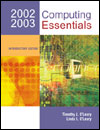

 Computing Essentials 2002-2003 Intro, 14/e The Internet, the Web, and Electronic Commerce Multiple Choice |

 2002 McGraw-Hill Higher Education
2002 McGraw-Hill Higher EducationAny use is subject to the Terms of Use and Privacy Policy.
McGraw-Hill Higher Education is one of the many fine businesses of The McGraw-Hill Companies.